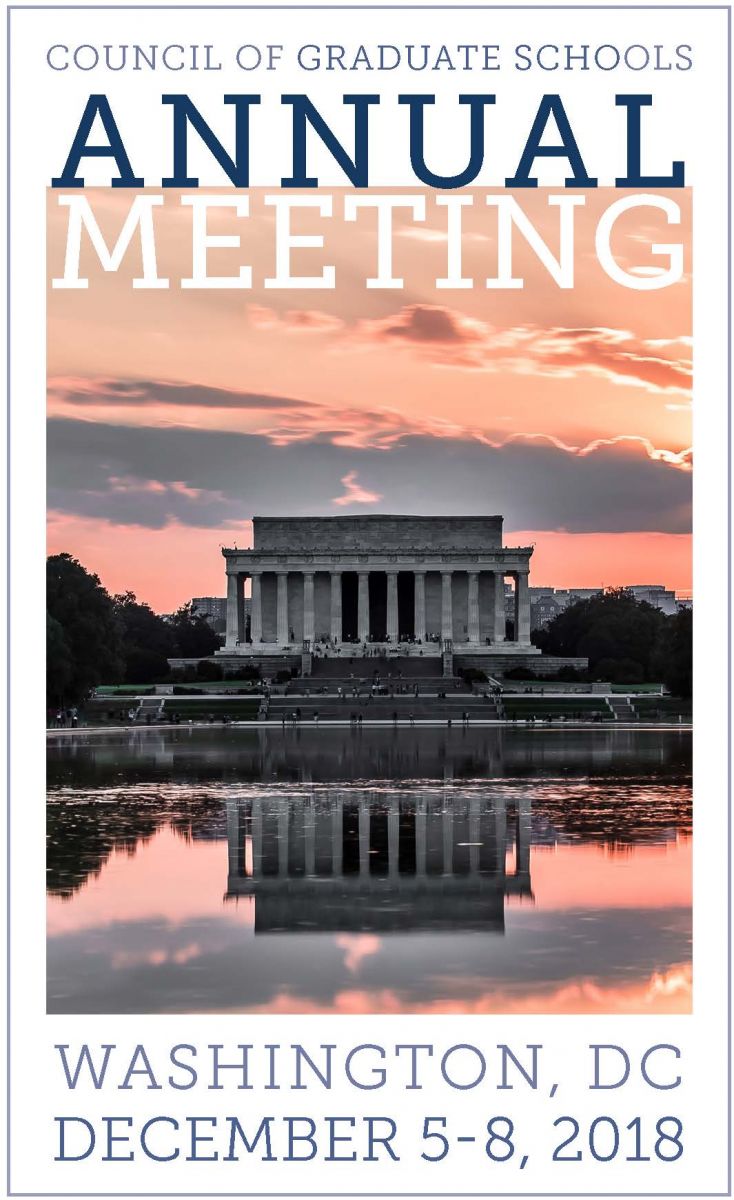You are on CGS' Legacy Site.
Thank you for visiting CGS! You are currently using CGS' legacy site, which is no longer supported. For up-to-date information, including publications purchasing and meeting information, please visit cgsnet.org.
Member Engagement
Member Engagement

CGS membership provides opportunities to engage with an active community of institutions and organizations that support graduate education. We invite you to explore our categories of membership and their distinct benefits, which include data analysis and best practice expertise, discounts on meetings and publications, and opportunities to exchange information and resources with fellow members.
CGS 2018 Annual Meeting
Preparing Ethical Leaders
December 5-8, 2018
Location:
Omni Shoreham Hotel
Washington, DC 20008
Registration opens August 2018
Annual Meeting participants will explore important issues in graduate education. Enjoy a unique forum to meet leaders in your field and exchange ideas and information. Graduate deans; associate and assistant deans; faculty and staff from colleges and universities; association, federal and state agency, and other education-related administrators; graduate students, and others interested in graduate education are welcome.
Pre-meeting workshops and the CGS opening dinner and reception kicks off the meeting on December 5. The meeting continues December 6-8 with plenary sessions, concurrent sessions, and the annual awards ceremony luncheon. A lively exhibit hall will feature coffee and snack breaks, December 6-7.
For information about exhibiting at the meeting or sponsorship opportunities, please see our 2018 Marketing Prospectus or contact Adrienne Vincent.
The training of graduate students in science is no laughing matter. But the cascade of reports issued on the topic over the past quarter-century has become something of an inside joke among those who care about graduate education in science, technology, engineering, and math (STEM) fields. So, when a committee of the National Academies of Sciences, Engineering, and Medicine (NASEM) this week issued a report on “revitalizing” graduate STEM education that referenced 19 related studies, its chairperson wasn’t surprised.
A new report from the Brookings Institution argues that the federal government is forgoing hundreds of millions in tax revenue each year through a tax credit that largely benefits graduate students with high incomes. Advocates for graduate education, though, say the report reinforces a false dichotomy between supporting undergraduate and graduate education. Beth Buehlmann of the Council of Graduate Schools said assessing the tax credit based on the income of those claiming it doesn’t account for the whole financial picture of those students. Those borrowers have different life circumstances than those who claim the Lifetime Learning Credit, she said -- they’re older, they may have dependents and their occupation may require a master’s degree in order to advance.
Alyson Nelson has been teaching science to high school students for more than a decade and believes setting lofty expectations rather than underestimating them will help her students achieve even loftier goals. After completing her bachelor’s degree from Clemson University, Nelson began working at Mauldin High School in South Carolina and simultaneously pursued her master’s degree in educational technology and a graduate certificate in school technology coordination at Boise State University. Now she teaches biomedical engineering at the Nikola Tesla STEM High School in Redmond, WA.
Hired in 2013 to develop a signature STEM Lab at the recently opened school, Nelson says people are surprised to hear high school students are taking biomedical engineering courses. Her students are 17-18 years old and developing prosthetics, trying to better understand pandemic infections, and looking for ways to care for and cure patients. “My students are really open to whatever they want to pursue. When the project is relevant to them, they are so much more confident in what they are doing, and they’re so much more passionate about really finding a solution,” said Nelson.
Ms. Nelson was recently named a Paul Allen Distinguished Educator, which “recognizes and rewards teachers who ‘break the mold’ of traditional schooling to provide students with opportunities to become thinkers, makers, and creators through computer science, engineering, and entrepreneurship.” To learn more about Alyson’s work visit the Boise State University website and her webpage on the Allen Distinguished Educators website.
Visit the GradImpact Feature Gallery to learn more about the amazing, innovative research being done by graduate students and alumni across the world.
The CGS GRADIMPACT project draws from member examples to tell the larger story of graduate education. Our goal is to demonstrate the importance of graduate education not only to degree holders, but also to the communities where we live and work. Do you have a great story to share about the impact of master’s or doctoral education? Visit our WEBSITE for more information.
U.S. graduate education in science, technology, engineering and math is, in many ways, the “gold standard” for the world. But it can and must better prepare graduates for a changing science landscape and multiple careers. It should also be more transparent in terms of where graduates end up working. So says a major new report on the future of graduate STEM education from the National Academies of Sciences, Engineering and Medicine. The report was drafted by the Committee on Revitalizing Graduate STEM Education for the 21st Century, chaired by Alan Leshner, chief executive officer emeritus of the American Association for the Advancement of Science.
For international students, studying in the United States may be losing some of its luster. While there were more international students here in the 2016-17 academic year than ever before, there are signs that the growth has begun to slow.
Fill the pipeline and get talented prospects ready by adopting these strategies.
Extensive research demonstrates that the gender pay gap exists, but there are many skeptics who still think otherwise.
We look at the social media movement, #blackandhooded, which has grown from a hashtag on social media into a scholarship fund and network for black academics. We talk with one founder and then talk to an analyst about why minority students are so underrepresented in graduate studies.
In an opinion piece published last week, Julie R. Posselt and Casey W. Miller, made the argument that the “test-optional” movement not only has merit but must be a conversation in doctoral programs across the country. We agree that “a serious conversation about current admissions” in graduate education is necessary. We agree that this conversation requires critical introspection and candid conversations. But, we caution faculty members and admissions committees to look beyond what may seem a simple solution of going test-optional before addressing the hard work of analysis and introspection.




